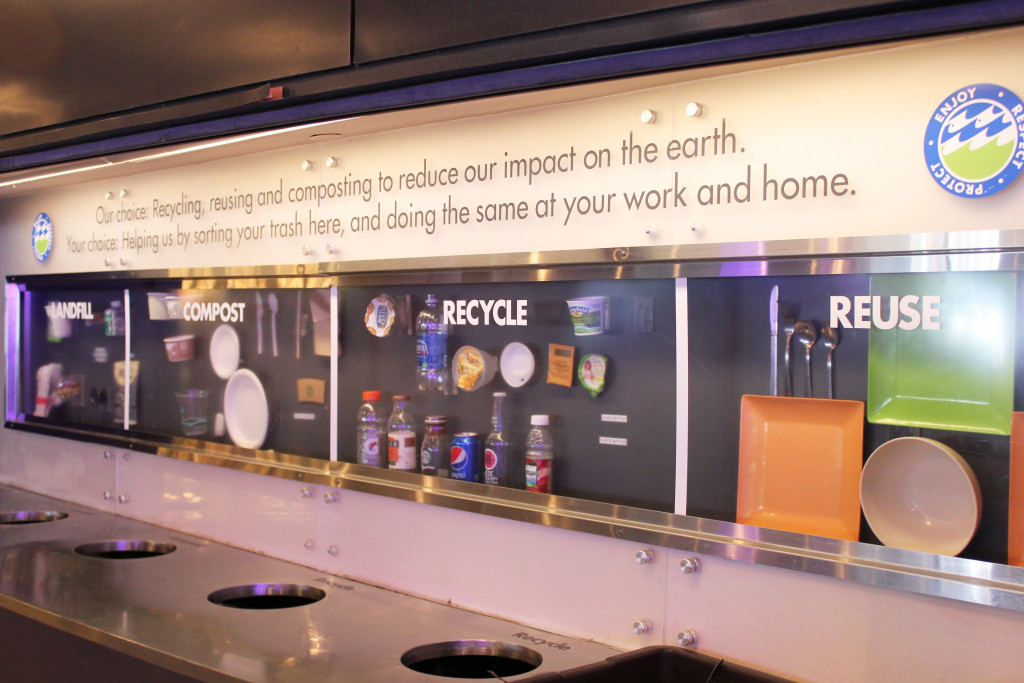
Tips for Better Recycling
Sep 15, 2015Recycling: It's not as simple as I assumed. Even if manufacturers choose to use materials that can be recycled, the post below, from a member of my team, Ashley S. Cooke, taught me that there's more I can do to help make sure that my garbage gets recycled.
During a recent family trip to Baltimore and the National Aquarium, I was struck by the great amount of effort the aquarium put forth to educate guests on conservation and environmental health. As a few examples, they handed out free pocket guides that identify sustainable and healthy seafood, and displayed inspiring quotes about the importance of conservation. However, the effort that I most appreciated was in their cafeteria, where they encouraged guests to sort their lunch trash into appropriate categories, by providing an intriguing visual guide on recycling. It was great to see this system work as I watched many cafeteria guests divide their trash into the four recycling compartments according to the guide. It was especially a pleasure to see that children found this activity to be a fun way to throw away trash!

The experience made me realize that there is a lot I don’t know about recycling, and it inspired me to improve my own family’s habits. While I researched what practices were acceptable in my community, I came across many common rules that I found surprising - they were a big help in improving my family’s recycling! Use the facts below to become more confident that your own family is recycling properly.
It isn't that easy to recycle pizza boxes.
Pizza boxes are generally not recyclable because of the fatty food residue that often sticks to the box (think the oil stains that are left once the pizza is gone). To try and recycle some of the box, separate the clean cardboard, and discard any sections that are compromised with food residue.
It’s best to remove the labels from cans and bottles.
When recycling cans and bottles, you don’t need to remove labels, since processing will likely discard them without any problem. However, if the labels are easy to remove, it’s still best to do so, because you can add them to your paper-recycling bin!
Plastic bottle caps should go in the trash.
Plastic bottle caps (from water bottles, for example) should not be tossed into the recycling bin. Caps are usually made from different plastics than the bottles, which makes them hard to recycle. They also can jam processing machines, and can even pose a hazard to recycling workers.
Broken glass shouldn’t be added to glass recyclables.
Broken glass is considered a hazard for handlers, and should not be added to curbside recycling bins.
Junk mail, glossy advertisements, magazines, etc. are recyclable.
Paper is easy to recycle, and both gloss and matte paper products are acceptable. Be careful not to recycle junk mail that has plastic in it, such as credit cards, and to remove any personal information that may make you vulnerable to identity theft.
Pyrex, ceramic, mirrors, and lightbulbs can't be recycled at home.
Because of material coatings, metal components, and different melting points, these items are not fit for recycling with normal glass. Thus, they should not be added to curbside bins with other glass recyclables.
To make your habits even greener, try to eliminate the amount of waste you create. For instance, using the same stainless steel water bottle is better for the environment than recycling plastic ones. Similarly, cutting down on the amount of junk mail, catalogues, and magazines you receive is better than recycling paper! For more details on what is recyclable, check your community’s policies, as well as your local drop-off facilities, which may accept items like broken glass and lightbulbs after they have been separated.



